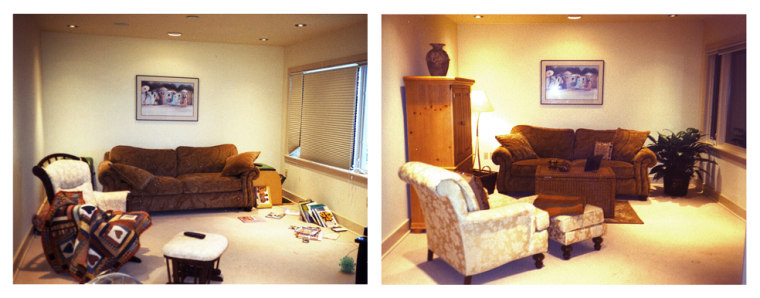As the number of unsold homes on the market rises, prospective home sellers are trying to beat the days-on-market averages. But before they lower expectations along with their selling price, there is a far less costly option to consider — "staging" the home for sale.
Home staging is simply the merchandising of a house to capture the hearts and bids of potential buyers. The objective: making a good first impression.
“The way you live in a home and the way you sell your house are two different things,” said Barb Schwarz, who created the home staging concept in 1972. She has since developed an accreditation program for staging professionals — known as ASP — and is president and CEO of StagedHomes.com.
If the concept seems like just another fee layer guaranteed to inflate selling expenses, think again. A 2003 HomeGain Survey found that home staging paid for itself — and then some — by boosting the final selling price.
According to a 2006 StagedHomes.com survey, homes listed for sale without staging spent an average 4.5 months on the market; homes staged before listing spent less than 1.5 months on the market. The average time for a staged home to reach a ‘sales pending’ status was about a week. And staging boosts the estimated sales price by 3 percent, according to other industry surveys. On average, certified stagers charge $1,900 per listing, Schwarz estimates, although that varies widely depending on region.
While no independent national surveys have been conducted to substantiate these industry claims, anecdotal evidence suggests the ranks of staging adherents are growing.
Pat Vredevoogd Combs, president-elect of the National Association of Realtors and a Grand Rapids, Mich., Realtor, is among those who prefers that her listings be staged; she even pays for clients’ first hour of consultation with a stager.
“Sellers are too used to their homes," said Vredevoogd Combs, who has personally used stagers to sell her own homes. "They just cannot see them through the eyes of a buyer.”
Lori Corken, a realtor with RE/MAX in Denver, not only uses stagers for all of her listings, she covers the cost.
“Once you decide to sell, you need to detach," she said. "The home is no longer about you, but a house that needs to appeal to its next owner.”
The stager makes that leap for the homeowner by figuring out how to showcase the best features of each room, she said.
Staging should not be confused with decorating.
“Decorating means personalizing your space — staging is about depersonalizing it,” explains Schwarz. “Nor is staging about selling people stuff — people have too much stuff already.”
Staging is more about putting that stuff away, and literally getting it out of the way of prospective Realtors, buyers and appraisers. Ultimately staging is about helping prospective buyers see themselves occupying the space.
When that space involves a vacant home, buyers may need extra help with their vision. Even with rented furniture, a vacant home lacks the energy an occupied home radiates. That is where Showhomes Franchise Corporation www.showhomes.com comes in.
Headquartered in Mobile, Ala., Showhomes has been staging homes nationally for 20 years. But it practices a more extreme form. The company moves one of its home managers — along with the manager's family and possessions — into a vacant home. Then the home manager stays until the listed home is sold and closes.
Professional golfer Jeff Johnson and his wife, Rebecca, were uncertain where they wanted to live when they moved their family to Charlotte, N.C., late last year, so they signed up with Showhomes to be ‘home managers.’ They are already in their fourth home.
“All three of their previous homes sold for 94 to 97 percent of their list price," according to Lucy Henner, director of marketing for Showhomes. And they sold within weeks of the Johnsons moving in.
“It was too easy,” says Tina Seitz, who along with her husband recently sold a spec home they owned in the Scottsdale, Ariz., area soon after contracting with Showhomes.
“It would have cost us a fortune to stage it with rented furniture," said Seitz. "The quality was much better with the home manager living there—she took an obvious pride in the way our house looked.”
The Seitz’ house was on the market for 90 days but sold 10 days after the Showhomes home manager moved in.
However you approach the concept of staging, you should study a stager’s sample portfolio of ‘before’ and ‘after’ pictures and ask for references before engaging one, according to Jim Kinney, president of Rubloff Residential Properties in Chicago. It's also a good idea to compare fees, he said.
While Corken and Vredevoogd Combs cover at least some of their clients’ staging costs, homeowners typically pay for the service themselves, often before engaging a real estate agent. Staging fees can range from a few hundred dollars to prepare a detailed analysis and to-do list for the homeowner to several thousand dollars to hire the stager to orchestrate whatever needs to be done. Renting furniture adds to the expense.
The cost varies quite a bit by region, says Schwarz. On the West Coast, where staging originated, fees typically range from $1,500 to $3,000 depending on the size of the project, she says. In New York, the range is $2,500 to $5,000. For the Midwest, figure $750 to $1,800.
Schwarz estimates that about 28 percent of homes for sale nationwide are staged, which means staging still offers a way of distinguishing one property from the next.
“Just do not look at it as an excuse to defend an unrealistic price,” warns Kinney.
Pricing a home appropriately remains the best strategy when selling. The purpose of staging is to make sure buyers can literally see that the price is right.
